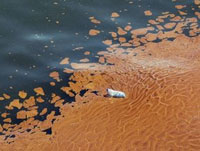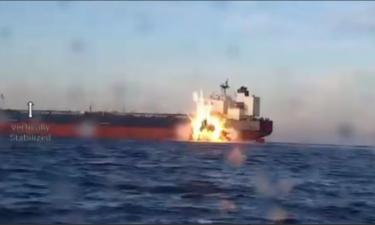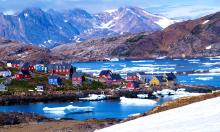US Administration Helplessly Watches Oil Slick Growing Bigger
US Attorney General Eric Holder announced the beginning of the criminal investigation filed into the breakdown on the oil platform in the Gulf of Mexico. The explosion on the platform killed 11 and triggered the worst ecological disaster in US history. The official stated that there were enough reasons to launch the criminal investigation into the case, although it is not clear yet who is going to be the defendant.

Experts believe that oil giant British Petroleum can be charged with violating the ecology law of the United States. It will be possible to substantiate the charges only if it is proved that employees of the company were negligent in their actions or if they conducted such actions deliberately, in violation of the law.
"We will be meticulous, we will be comprehensive, and we will be aggressive. We will not rest until justice is done,” holder said.
Russia Today: Soviet nuclear solution could be part of tactics to halt oil spill
The BP attempted to contain the oil spill, but none of the efforts taken led to any positive result. At least 12,000 barrels of oil leak from the ruptured pipe daily, experts say. Officials of the US administration say that it will continue before August, until specialists build two additional wells to contain the leak.
The ecological disaster in the Gulf of Mexico beat the Exxon Valdez oil tanker tragedy in 1989 and has thus become the most terrible ecological disaster in the history of the United States.
The Exxon Valdez oil spill occurred in Prince William Sound, Alaska, on March 24, 1989, when the Exxon Valdez, an oil tanker bound for Long Beach, California, hit Prince William Sound's Bligh Reef and spilled an estimated minimum 10.8 million US gallons (40.9 million litres, or 250,000 barrels) of crude oil. The consequences of the current disaster on the Deepwater Horizon platform will most likely be a lot more dramatic.
US officials say that they are aware of the situation and stay on top of issues. They regularly visit the disaster-stricken areas and say that the number of workers involved in the works to liquidate the consequences of the disaster will be tripled.
However, many American and foreign experts already doubt that the Obama administration is capable of handling the situation. Ken Salazar, the US Secretary of the Interior, has recently stated that BP had not executed the goals which it was supposed to pursue during the very first days of the tragedy in the Gulf. There is no certainty that the BP management knows what it does, the official added.
Experts say that both the US government and BP have been taking spontaneous actions since the first day of the disaster. The tragedy proved that no one was prepared for it. The US National Oceanic and Atmospheric Administration (NOAA) had no equipment to measure the thickness of the oil slick, and the sea maps, which could be helpful in evaluating the scale of ecological consequences, were outdated.
Several fishermen hired by BP to protect the Louisiana shoreline from the massive oil slick were hospitalized. All of them complain of short breath, dizziness, headache and chest pains. Medics say that the symptoms could have been caused with the dispersants, which BP used to reduce the surface tension, destroy the surface film and separate oil into fine particles that could then disperse in a layer of water.
“The EPA on May 10 authorized BP to use two dispersants - Corexit 9500 and Corexit EC9527A, distributed by the Tennessee and Texas units of Nalco Co. in Illinois. BP had already applied those products at the spill site for nearly two weeks. As concerns about Corexit grew, however, the EPA asked BP on May 19 to find a less-toxic dispersant within 24 hours, and to start using its replacement in 72 hours. BP answered that it wanted to stick with Corexit,” The Louisiana Weekly wrote.
Ecologists say that they can not predict which consequences Corexit might have on the flora and fauna of the region, not to mention the human population.
The Obama administration has only been observing the situation helplessly. Now it is trying to act proactively. Nevertheless, neither the governmental nor military departments have any funds or knowledge to contain the oil spill. President Obama has already said that Washington was fully dependent on BP at this point.
Louisiana Governor Bobby Jindal criticized the efforts of the Obama administration. The governor stated that the federal government has done "too little too late" and went on to comment that the oil spill "is not just about our coast -- it is fundamentally about our way of life in Louisiana."
BP has already lost $940 million because of the oil disaster. Afterwards, the company will have to compensate all the damage. The oil business in the United States is in a state of shock after Obama ordered to stop the drilling of test holes at 33 platforms in the Gulf of Mexico, extended a moratorium on new deepwater wells and announced stronger regulations on existing drilling.
It is already obvious that the ecological disaster in the Gulf of Mexico will become a very serious political test for the Obama administration. Obama must not repeat the mistake of his predecessor George W. Bush, which he made during the Hurricane Katrina disaster. At the same time, the tragedy in the Gulf may cast serious doubts on the new energy politics of the US president.
Obama said earlier that those standing against the development of new oil fields ignored the reality since America’s foreseeable future would depend on the extraction of fuel. Today the president has to acknowledge that the launch of many oil wells will have to be delayed indefinitely.
Ecologists say, though, that the huge oil slick may find itself in the so-called gyrating current of the Gulf of Mexico near Florida. If it happens, the Florida shoreline and Florida Keys islands will be in serious danger.
Ivan Tulyakov
Pravda.Ru
Subscribe to Pravda.Ru Telegram channel, Facebook, RSS!




